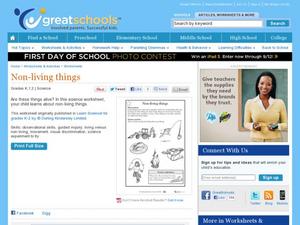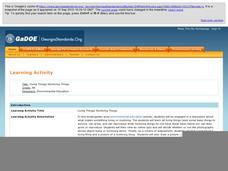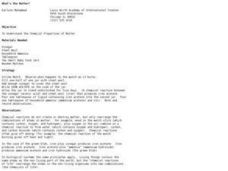North Clackamas Schools
Sorting Living and Nonliving Objects
Is a rock living? How about lima beans? You'll find everything you need for an interactive sorting activity exploring living and non-living things.
Curated OER
Can Young Children Distinguish Between Living and Non-living Things?
What does it mean to be living? Help your young scientists identify living and non-living things as a result of their learning through discovery. Observation of and interaction with a set of natural phenomena in their community will make...
Curated OER
Living and Non-Living Things
Take a walk and observe living and non-living things on the way. Young scientists practice making valuable observations and draw the details. You could require that your students complete a T chart of living and non-living things and...
Curated OER
Living and Non-Living Things in the Environment
Third graders examine living and non-living things and observe a plant growing in the classroom. There are many additional resources to assist learning and extension work, they can read books, interact with PowerPoint presentations, and...
Kindergarten Kindergarten
Living and Non-Living Sort
What do an ice cream cone, bicycle, and alarm clock all have in common? That's exactly what young scientists will find out as sort these pictures and learn about the differences between living and non-living things.
Curriculum Corner
Living/Non-Living Objects
Which of these pictures is living? Which one is non-living? Use a set of pictures to introduce living and non-living objects to young scientists.
Curated OER
Non-living Things
Very young scientists circle the things on the worksheet that they think are living things. Most of the pictures are of non-living things. A handy worksheet to use during any initial discussion about living vs. non-living things.
Pace University
Grade 6-8 Living Things
What characterizes a living thing? Scholars explore the concept during a differentiated instruction unit on living things. They perform lab experiments to determine how animals adapt to stimuli, watch videos and learn about...
Lerner Publishing
Living or Nonliving
It's alive! Or is it? Through a series of shared readings, whole class activities, and independent exercises children explore the difference between living and non-living things, creating a pair of printable books to demonstrate their...
Curated OER
Plants and Ecosystems
The relationships within and between ecosystems can be explored. after examining an area for living and non-living things students complete the same examination in the forest ecosystem. Students identify abiotic and biotic elements in an...
Curated OER
Living-Nonliving
Students determine that environments have living and nonliving parts. They discuss what makes something a living thing and something a nonliving thing. They make a chart and list characteristics of living things and nonliving things.
Curated OER
Living And Non-Living Things (2.1)
In this comprehensive review of living and non-living things worksheet, students answer questions about the two categories. Students answer fifteen multiple choice, true and false, and fill in the blank questions.
Georgia Department of Education
Living Things/ Nonliving Things
How can you tell if something is living or nonliving? Introduce a set of criteria which can be used to determine which things are alive and which are not. The class discusses the basic needs of all living organisms, checks out an...
National Park Service
Living & Non-Living Interactions
What better way to learn about ecosystems than by getting outside and observing them first hand? Accompanying a field trip to a local park or outdoor space, this series of collaborative activities engages children in learning about the...
Curated OER
What's the Matter? (Living and Non-Living Things)
Understand how chemical reactions recombine atoms to create the "chemicals of life". An experiment, showing the basic chemical reactions of an iron nail or a match, helps young children start their understanding of permanent changes.
Curated OER
Terrariums: A Look at the Living and Nonliving World
Third graders examine life in a terrarium and relate it to life in a larger environment. In this terrarium lesson plan, 3rd graders examine how living and non-living things work together by examining the changes in a terrarium. They make...
Curated OER
Renewable vs. Non-Renewable Resources
Fifth graders are introduced to the important topic of renewable, and non-renewable, resources. They are expected to be able to correctly categorize different types of resources as renewable or non-renewable. Another emphasis of this...
Curated OER
Living and Non Living Things
First graders identify the characteristics of living and non living things. In this living and non living things lesson plan, 1st graders look through bags and categorize items that they see.
Curated OER
Living vs. Non-Living Things
Fourth graders describe the characteristics that determine if something is living, dead, or non-living. They determine the difference between living and non-living things. Students determine if an object is living or non-living and...
Curated OER
Living / Non-living
First graders shoot photographs of living and non-living things. In this living and non-living organism lesson, 1st graders discuss the attributes of living things, take digital photographs of living and non-living things, and design a...
Curated OER
Living or Non-Living
Students examine living and non-living things. In this life science instructional activity, students are given a group of objects and discuss if they are living or non-living. Students identify and list characteristics of living things.
Curated OER
Living & Non-Living
In this living and non-living organisms worksheet, students read 5 informational signs and decide whether 10 objects or living or non-living and circle their answer underneath each one. Students participate in a scavenger hunt where they...
Curated OER
Living and Nonliving Things
Students photograph five objects from a bag and five objects from the outdoors. Students categorize things by living and non-living and by properties such as color, size, structure and needs. Students draw conclusions about the basic...
Curated OER
Living it up with plants
Have kids in grades K-2 discuss how they know a tree is alive. The worksheet provides simplistic background information and an observation check list. They check off the ways that they can tell an oak tree is a living thing. Note: The...
Other popular searches
- Non Living Things
- Non Living Organisms
- Non Living Things
- Laving and Non Living Things
- Lving and Non Living Things

























